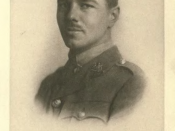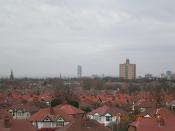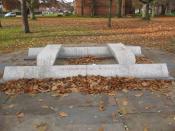Owen's poem serves to uncover the lie that it is sweet and becoming to die for one's country. Owen's use of diction, vivid language, and graphic imagery emphasizes his point. The poem describes the fatigue, blindness, evil, obscenity, death, sufferings, and disgust of war. It shows the true life of a soldier, lying low, ill, endlessly trudging through mud with bloody feet, away from and into the pain of gas poisoning of comrades, and away from the injured and dead, but never away from the memories. It ends with a bitter attack on those who see glory in the death of others. The only beauty in this poem is an idea that rest will come. Unfortunately, it is pointed out that the only rest is an undignified death; for those who sleep, sleep restlessly. The ugliness of war is described as low like old beggars under sacks, diseased coughing like hags, blood-shod.
All went lame, all blind, exhausting drunk with fatigue, pointless flound'ring . . . Dim . . As under a green sea . . . drowning, careless of living or dead flung aside, evil like a devil's sick of sin, disgusting like eyes writhing . . . blood gargling from the froth-corrupted lungs. . . vile, incurable sores, bitter as the cud, and merciless on innocent tongues. The comparisons of lines 1, 14, 20, and 23 through 24, describe the soldier as someone the reader can see and war as the disease Owen wants the inexperienced to understand. 1 Bent double, like old beggars under sacks, 14 As under a green sea, I saw him drowning. 20 His hanging face, like a devil's sick of sin; This places the reader in the soldier's place--drowning, stumbling, and fumbling--and shows the lack of glory in war. These...



Is this an essay?
Will somebody tell me wether this is an essay or a paragraph and ho wit was accepted ..????
2 out of 3 people found this comment useful.